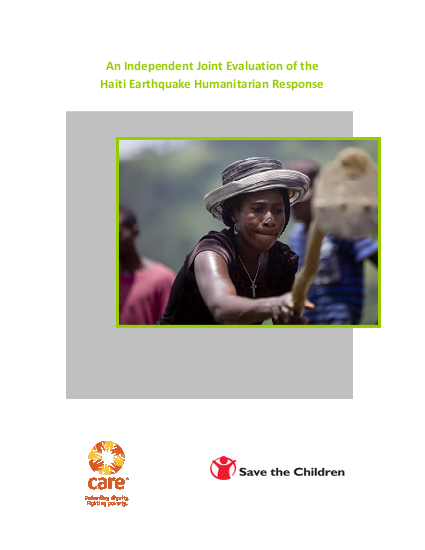
Objectives: The purpose of this joint evaluation is to provide to participating organizations a measure of the effect of their post earthquake’s emergency intervention in Haiti within the first 7 months and to draw clear recommendations for longer term programming for the coming 5 years.
Specific Objectives a) To provide an assessment of the relevance and timeliness of the humanitarian response to the earthquake so far using the DAC criteria of:
- Relevance /appropriateness
- Connectedness
- Coherence
- Coverage
b) To draw out key lessons to inform agencies recovery plans, with consideration given to implementation according to benchmarks and targets in each agency’s accountability framework
- Commitment to agreed humanitarian principles, standards and behaviours in addition to performance in each organization core sectors and in cross-cutting issues (protection, gender equality, local context, participation of primary stakeholders).
- How far have agencies built on local capacity?
- Accountability to beneficiaries: to what extent the affected population has been involved in all stages
c) To determine to what extent agencies are building on lessons learnt from similar humanitarian responses, specifically previous earthquake responses.
d) To determine to what extent synergies, cooperation and integration have occurred.
e) What are the negative impacts of the early response, especially for the longer term (such as increased concentration of power, authority and economic resources or focusing on sites instead of communities). Is the “do no harm” approach applied?
f) Advocacy: to what extent the organizations used their network to promote key priorities of the affected population at the highest level.
g) To highlight any unmet needs or unnecessary overlap that should be addressed further during the response.
Resource collections
- Accountability to affected populations (AAP)
- Evaluating humanitarian action
- Monitoring of humanitarian action
- UN Habitat - Urban Response Collection
- Urban Response - Urban Crisis Preparedness and Risk Reduction
- Urban Response Collection - Community Engagement and Social Cohesion
- Urban Response Collection - Economic Recovery
- Urban Response Collection - Environment and Climate Change
- Urban Response Collection - Housing, Land and Property
- Urban Response Collection - Urban Crisis Response, Recovery and Reconstruction
- Urban Response Collection - Urban Resilience